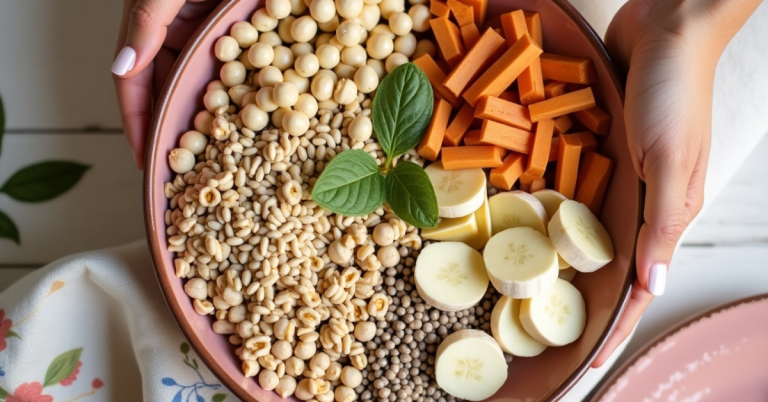Gut Health 101: 5 Fermented Foods to Add to Your Diet Today
Are you tired of feeling bloated, sluggish, and out of sync with your body? The secret to a healthier you might be hiding in your kitchen, and it’s not another fad diet or expensive supplement. 🥬🥛
Enter the world of fermented foods – nature’s powerhouse of probiotics and gut-friendly goodness. These ancient culinary wonders have been transforming our health for centuries, and it’s time you reaped their benefits too. From boosting your immune system to potentially improving your mental health, fermented foods are the unsung heroes of a balanced diet.
But where do you start? Don’t worry, we’ve got you covered. In this blog post, we’ll dive into the fascinating world of fermentation, explore its myriad health benefits, and introduce you to five delicious fermented foods you can easily add to your diet today. Get ready to revolutionize your gut health and unlock a new level of well-being as we guide you through understanding fermented foods, their incredible advantages, and practical ways to incorporate them into your daily meals. Let’s embark on this flavorful journey to a healthier, happier you! 🌟
Understanding Fermented Foods
A. Definition and process of fermentation
Fermentation is a metabolic process where microorganisms convert sugars into acids, gases, or alcohol. This ancient technique has been used for food preservation and enhancement for nearly 10,000 years. The process involves the breakdown of complex compounds into simpler ones, often resulting in unique flavors, textures, and nutritional profiles.
B. Types of fermentation
There are several types of fermentation, with the three main categories being:
- Lactic acid fermentation
- Alcoholic fermentation
- Acetic acid fermentation
| Type | End Product | Common Examples |
|---|---|---|
| Lactic acid | Lactic acid | Yogurt, sauerkraut, kimchi |
| Alcoholic | Ethanol | Beer, wine, kombucha |
| Acetic acid | Acetic acid | Vinegar |
Each type of fermentation involves specific microorganisms and produces distinct end products, contributing to the diverse array of fermented foods available today.
C. Nutritional enhancements through fermentation
Fermentation not only preserves food but also enhances its nutritional value:
- Increases bioavailability of nutrients
- Produces bioactive compounds
- Improves digestibility of certain ingredients (e.g., lactose in dairy products)
- Releases bioactive peptides with potential health benefits
- Generates short-chain fatty acids (SCFAs)
- Enhances polyphenol content
These nutritional enhancements contribute to the various health benefits associated with fermented foods, including improved digestion, potential weight management, and a reduced risk of chronic diseases.
With this understanding of fermented foods, their types, and nutritional enhancements, we can now explore the specific health benefits these foods offer. In the next section, “Health Benefits of Fermented Foods,” we’ll delve into how these unique nutritional properties translate into tangible improvements in gut health, immune function, and overall well-being.
Health Benefits of Fermented Foods
Now that we’ve explored the concept of fermented foods, let’s delve into their numerous health benefits. These nutrient-rich foods offer a wide array of advantages for our overall well-being.
A. Improved digestion and nutrient absorption
Fermented foods play a crucial role in enhancing digestive health. The beneficial bacteria present in these foods contribute to a balanced gut microbiome, which is essential for proper digestion. By promoting a healthy gut environment, fermented foods can:
- Improve the breakdown of nutrients
- Enhance the absorption of vitamins and minerals
- Alleviate digestive disorders
B. Enhanced gut microbiome diversity
The consumption of fermented foods significantly impacts the diversity of our gut microbiome. A varied microbiome is associated with better overall health outcomes. Here’s how fermented foods contribute:
| Fermented Food | Beneficial Microorganisms |
|---|---|
| Yogurt | Probiotics |
| Kimchi | Lactic acid bacteria |
| Kefir | Yeasts and bacteria |
C. Boosted immune system function
Fermented foods play a vital role in supporting our immune system. The probiotics found in these foods can:
- Displace harmful bacteria
- Strengthen the gut barrier
- Enhance overall immune response
D. Potential mental health improvements
Emerging research suggests a connection between gut health and brain function. Consuming fermented foods may contribute to:
- Reduced anxiety and depression symptoms
- Improved cognitive abilities
- Enhanced mood regulation
E. Reduced inflammation in the body
Fermented foods have shown promise in reducing inflammation throughout the body. This anti-inflammatory effect can lead to:
- Lower risk of chronic diseases
- Improved cardiovascular health
- Better weight management
With these remarkable health benefits in mind, next, we’ll explore the top 5 fermented foods you can easily add to your diet to reap these advantages.
Top 5 Fermented Foods to Add to Your Diet

Now that we’ve explored the health benefits of fermented foods, let’s dive into the top 5 fermented foods you can easily add to your diet. These options are not only delicious but also packed with probiotics and nutrients to support your gut health.
A. Yogurt and kefir: Probiotic-rich dairy options
Yogurt and kefir are excellent sources of probiotics and protein. While yogurt is a well-known fermented dairy product, kefir offers a unique twist:
- Yogurt: Contains live active cultures and high protein content
- Kefir: A fermented milk drink available in both dairy and non-dairy options
Both provide diverse strains of gut-friendly bacteria, supporting digestive health and boosting immunity.
B. Kombucha: A refreshing fermented beverage
Kombucha is a fizzy tea beverage fermented with bacteria and yeast. While it’s lower on the hierarchy of fermented foods due to its sugar content, it still offers benefits:
- Rich in antioxidants
- Available in various flavors
- Can be homemade to control sugar levels
Enjoy kombucha in moderation as a refreshing alternative to sugary drinks.
C. Sauerkraut and kimchi: Nutrient-packed fermented vegetables
These fermented vegetables are at the top of the list for gut health:
| Feature | Sauerkraut | Kimchi |
|---|---|---|
| Base ingredient | Cabbage | Various vegetables |
| Key nutrients | Fiber, Vitamins C and K | Fiber, probiotics |
| Unique properties | Anti-inflammatory | Diverse bacterial strains |
Both options are rich in probiotics and offer antioxidant properties. They’re versatile and can be easily incorporated into various dishes.
D. Miso and tempeh: Versatile fermented soy products
Fermented soy products offer unique health benefits:
- Miso: A fermented soybean paste best consumed raw for maximum probiotic benefits
- Tempeh: A nutritious meat substitute with proteins broken down for better absorption
While tempeh is often pasteurized, limiting its probiotic content, both miso and tempeh provide valuable nutrients and can support overall gut health.
E. Sourdough bread: A digestible fermented grain option
Sourdough bread stands out among grain products due to its fermentation process:
- Enhanced nutrient availability
- Potentially easier to digest compared to regular bread
- Contains beneficial bacteria from the fermentation process
While not as probiotic-rich as other options on this list, sourdough bread can be a healthier alternative to traditional bread for those looking to incorporate fermented foods into their diet.
With these top 5 fermented foods in mind, let’s explore how to incorporate them into your daily meals effectively.
Incorporating Fermented Foods into Your Diet
Now that we’ve explored the top 5 fermented foods to add to your diet, let’s discuss how to incorporate these probiotic-rich options into your daily meals. While these foods are not required for survival, they can significantly enhance your gut health and overall well-being.
A. Starting your day with probiotic-rich breakfast options
To kickstart your day with a boost of beneficial bacteria, consider adding fermented foods to your breakfast routine. Here are some ideas:
- Yogurt parfait with fresh fruits and granola
- Kefir smoothie with berries and spinach
- Sourdough toast with avocado and sauerkraut
B. Adding fermented vegetables to meals
Fermented vegetables are versatile and can be incorporated into various dishes throughout the day. Try these options:
- Add kimchi to stir-fries or rice bowls
- Include pickles as a side dish with sandwiches
- Mix sauerkraut into salads or use as a topping for grilled meats
C. Using fermented ingredients in cooking and as condiments
Fermented ingredients can elevate the flavor profile of your dishes while providing probiotic benefits. Consider these applications:
| Fermented Ingredient | Culinary Use |
|---|---|
| Miso paste | Soups, marinades, dressings |
| Fish sauce | Stir-fries, dipping sauces |
| Tempeh | Vegetarian protein substitute |
| Kombucha | Salad dressings, meat marinades |
D. Choosing fermented beverages as healthy alternatives
Fermented beverages offer a refreshing way to consume probiotics. Here are some options to consider:
- Replace sugary sodas with kombucha
- Enjoy kefir as a post-workout drink
- Sip on probiotic-rich kvass instead of alcoholic beverages
By incorporating these fermented foods and beverages into your daily diet, you can easily increase your probiotic intake. While they are not mandatory, these options provide a flavorful and beneficial addition to your meals. In the next section, we’ll explore how to maximize the benefits of fermented foods to ensure you’re getting the most out of these probiotic powerhouses.
Maximizing the Benefits of Fermented Foods
Now that we’ve covered how to incorporate fermented foods into your diet, let’s explore how to maximize their benefits. By following these key strategies, you can ensure you’re getting the most out of these nutritious and gut-friendly foods.
A. Selecting raw and unpasteurized options
When choosing fermented foods, opt for raw and unpasteurized varieties whenever possible. These contain live probiotics, which are beneficial bacteria that support gut health. Look for products in the refrigerated section of your grocery store, as these are more likely to be unpasteurized and contain active cultures.
| Fermented Food | Raw/Unpasteurized Option | Pasteurized Option |
|---|---|---|
| Yogurt | With “live cultures” | Heat-treated |
| Sauerkraut | Refrigerated | Shelf-stable |
| Kombucha | Raw, unfiltered | Pasteurized |
B. Balancing probiotics with prebiotic foods
To maximize the benefits of fermented foods, it’s essential to pair them with prebiotic foods. Prebiotics serve as food for the beneficial bacteria in your gut, helping them thrive. Some excellent prebiotic foods include:
- Garlic
- Onions
- Bananas
- Asparagus
- Jerusalem artichokes
C. Avoiding added sugars in fermented products
Many commercial fermented products contain added sugars, which can negate some of the health benefits. When selecting fermented foods, always check the label and choose options with minimal or no added sugars. This is particularly important for products like yogurt and kombucha, which often come in sweetened varieties.
D. Gradual introduction to prevent digestive discomfort
If you’re new to fermented foods, it’s crucial to introduce them gradually into your diet. Starting with small amounts and slowly increasing your intake can help prevent digestive discomfort. Begin with a tablespoon of fermented food per day and gradually increase to a serving size over several weeks. This approach allows your gut to adjust to the new beneficial bacteria and reduces the likelihood of experiencing bloating or gas.
Remember, while fermented foods are generally safe for most people, those with compromised immune systems or specific health conditions should consult with a healthcare provider before significantly increasing their consumption of these products.
Incorporating fermented foods into your diet is a powerful step towards improving your gut health and overall well-being. From yogurt and kefir to kombucha, sauerkraut, and kimchi, these probiotic-rich foods offer a wide range of benefits, including enhanced digestion, improved nutrient absorption, and a stronger immune system. By adding these five fermented foods to your daily meals, you’re not only diversifying your palate but also nourishing your gut microbiome with beneficial bacteria.
Remember, the key to maximizing the benefits of fermented foods lies in consistency and variety. Start small by incorporating one or two options into your diet, and gradually expand your repertoire. Choose raw, unpasteurized varieties when possible to ensure you’re getting live probiotics, and pair them with prebiotic-rich foods to further support your gut health. With time and patience, you’ll likely notice improvements in your digestion, energy levels, and overall health. So why wait? Begin your journey to better gut health today by embracing the power of fermented foods.







